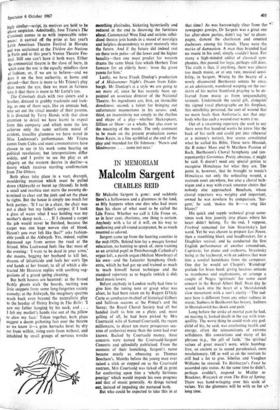Malcolm Sargent
IN MEMORIAM CHARLES REID
Sir Malcolm Sargent is gone: and suddenly there's a hollowness and a glumness in the land, as fitly happens when one dies who had more than his share of what used to be called the Life Force. Whether we call it Life Force or, as in later cant, charisma, one thing is certain. Anybody with a lot of it will, on his way to mellowing and all-round acceptance, be as much resented as adored.
Sargent came up from the hunting counties in the mid-1920s. Behind him lay a meagre formal education, no hunting to speak of, stern training as an articled pupil in Peterborough Cathedral's organ loft, a parish organ (Melton Mowbray) of his own—and the Leicester Symphony Orch- estra, which he had got up and trained as much to teach himself baton technique and the standard repertory as to beguile (which it did) local music lovers.
Before anybody in London really had time to give him the tuning note or grasp what was afoot, he had been taken on by Rupert D'Oyly Carte as conductor-in-chief of historical Gilbert and Sullivan seasons at the Prince's and the, Savoy; the Royal Choral Society had all but handed itself to him on a plate; and, most galling of all, he had been picked by Mrs Courtauld, wife of Samuel Courtauld, the rayon millionaire, to direct ten more prosperous sea- sons of orchestral music than the town had ever known. Backed by Courtauld money, these concerts were named the Courtauld-Sargent Concerts and splendidly publicised. From the moment of their launching, Sargent's name became nearly as obsessing as Thomas Beecham's. Months before the young man ever raised a stick or stepped on to the Courtauld rostrum, Mrs Courtauld was ticked off in print for conferring upon him a 'wholly fictitious prestige' which would impede his own progress and that of music generally. As things turned out, instead of impeding she nurtured both.
But who could be expected to take this in at that time? As was harrowingly clear from the- newspaper gossips, Dr Sargent was a great one for after-show parties, didn't say 'no' to cham- pagne, • danced the charleston and counted duchesses among his friends. These were the marks of damnation. A man thus branded had no music in his soul, simply couldn't have. For many a high-minded addict of classical sym- phonies, this passed for logic, perhaps still does. The truth is that, if anything, there was almost too much music, or at any rate, musical sensi- bility, in Sargent. Wrung by the beauty of a newly discovered Beethoven sonata he once, as an adolescent, wandered weeping on the out- skirts of his native Stamford praying to be de- livered from music as from unquenchable. torment. Underneath the social gilt, alongside the signed royal photographs on his fireplace, this sensibility persisted, the sort of wound that no more heals than Amfortas's; not that any- body who has such a wound ever wants it to.
Out of a swarming repertory (he used to say there were five hundred works he knew like the back of his teeth and could put into rehearsal at a minute's notice), five scores constituted what he called his Bible. These were Messiah, the B minor Mass and St Matthew Passion of Bach, Beethoven's Choral Symphony and (un- repentantly) Gerontius. Pretty obvious, it might be said. It doesn't need any special genius to recognise Himalayas for what they are. The point is, however, that he brought to music's Himalayas not only the unhealing wound, a rostrum asset anywhere, but also a choral tech- nique and a way with crack amateur choirs that nobody else approached. Beecham, whose choral repertory was weighty and important, owned he was nowhere by comparison. 'Sar- gent,' he said, 'makes the b—s sing like blazes!'
His quick and supple technical grasp some- times took him jauntily into places where his heart didn't belong. To the end, I suppose, Firebird remained for him Stravinsky's last word. Yet he was chosen to prepare Les Noces, then a stumbling block and headbreaker, for a Diaghilev revival; and he conducted the first English performance of another conundrum, Capriccio, for piano and orchestra. Stravinsky being at the keyboard, with an address that won him a cordial handshake from the composer. One day he would set Chopin's 'Raindrop' prelude for brass band, giving luscious unisons to trombones and euphoniums, or arrange a couple of Negro 'spirituals' for some carol concert in the Royal Albert Hall. Next day he would look into the heart of a Shostakovich slow movement with a seer's clarity—'The sad- ness here is different from any other sadness in music. Sadness in Beethoven has beauty. Sadness in Shostakovich has shock and pain.'
Long before the strike of mortal pain he had, on nearing it, looked death in the eye with tran- quillity. The worst thing he could wish any god- child of his, he said, was everlasting health and energy, often the concomitants of extreme selfishness. His convictions and many of his phrases (e.g., the gift of faith,' the spiritual values of great music') were, while humbug- free, so ancient as to sound paradoxical, even revolutionary. Off as well as on the rostrum he still had a lot to give. Sibelius and Vaughan Williams he revered. To Belshazzar's Feast he accorded epic status. At the same time he didn't, perhaps couldn't, respond to Mahler or Bruckner, Wozzeck or even The Rite of Spring. There was hand-wringing over this scale of values. Yet the glumness will be with us for a' long time.


































 Previous page
Previous page